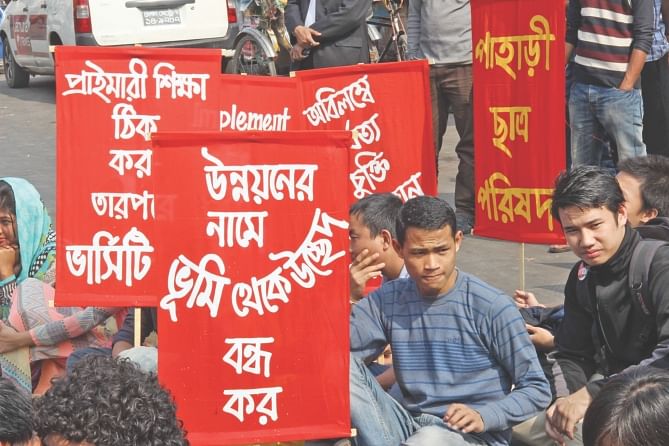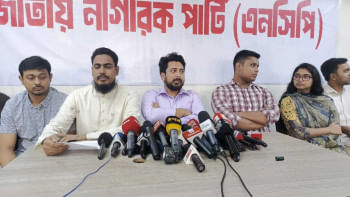Why a medical college at Rangamati?

The recent violence in Rangamati has stirred up anxieties among people from all walks of life. On January 10, following the inauguration of Rangamati Medical College ignoring mass opposition, there was a clash between the Pahari Chatra Parishad (PCP) and ruling party frontline organisations Chhatra League and Juba League. At the time, a dawn-to-dusk road and waterway blockade in Rangamati district was being peacefully observed by PCP demanding that the establishment of Medical College and University of Science & Technology in Rangamati be postponed until full implementation of CHT Accord of 1997. But at a certain stage, it turned into Jumma-Bengali communal clash, leaving nearly 40 persons injured, three houses ablaze and 5 commercial units vandalised. The administration had no alternative but to impose curfew to control the heated situation.
It is alleged that the local leadership of ruling Awami League took advantage to fuel communal sentiment through Samo Odhikar Andolon and its ally organisation, Parbatya Juba Front. They allegedly instigated the Bengali settlers, labourers and youth to carry out attacks on Jumma people. But the problem cannot be solved through instigating communal conflict; rather, communalism will aggravate the situation.
It is reported that the police and army arrested at least 35 persons for violation of Section 144. However, like the communal attack in 2012, the mastermind(s) of this violence is yet to be arrested.This culture of impunity facilitates perpetrators to commit offensive activities further.
It is a fact that the non-implementation of CHT Accord, even after the return to power of pro-accord government in 2009, has led to agitation among Jumma people. In addition, the continuous lip-service of the government about implementing the Accord for the last six years has given rise to more skepticism and dissatisfaction among the people. At the same time, the government programmes on CHT often contradict the CHT Accord, and appear to be hostile to Jumma wellbeing. These programmes include forcible acquisition and occupation of lands belonging to Jumma people in the name of reserve forests; establishment of BGB camps and army-managed tourist spots instead of resolving CHT land disputes; enactment of laws without consultation with, or ignoring the opinion of, CHT Regional Council and Jumma people; establishment of Science & Technology University and Medical College in Rangamati ignoring opposition of CHT people, etc.
In 2001, the then Awami League government, without prior consultation with the CHT Regional Council, formulated 'Rangamati Science and Technology University Act 2001.' The present government, in the same way, also took up the initiative to establish a Medical College in Rangamati very recently. From the very beginning, the CHT Regional Council (CHTRC), PCJSS as well as Jumma people and civic rights groups have been opposing the establishment of this college.
The government did not take into account the complex reality of the CHT and the issues arising out of it, such as special administrative system in the CHT, its unique features, ethnic diversity and backwardness. It is quite natural that enrolment in the proposed institutions will have to be filled by 90% of outside students if the admission process is completed as per the existing laws and policies of the said university and medical college. Similarly, most of the teachers, officers and staff will be recruited from outside. This means that the university and college will become centres for settlement of outsiders, which will be detrimental to the tribal-inhabited regional feature of CHT. In fact, due to gradual settlement of outsiders and occupation of land by illegal means for political motive, the life and livelihoods of the Jumma peoples are being seriously jeopardised. It is beyond doubt that if the two projects are implemented, the existing problems of the Jumma people in the social, cultural, political and economic spheres will become even more complex.
The CHT Accord stipulates maintaining the quota system for the tribal people in jobs and higher education, granting increased number of stipends for the tribal students and providing necessary scholarships for higher education and research in foreign countries. But no significant development has been made in this regard during the post-accord era. There are three government colleges in the hill districts and there is an opportunity of studying Honours courses on a few subjects only. The number of teachers is also very inadequate. Above all, the residential problem for teachers and students, including lack of educational materials, is acute. Besides, there are multi-faceted problems plaguing primary and secondary level education, including shortage of teachers, lack of education materials, administrative complexities, financial unsoundness etc. Hence, CHT people demanded the introduction of more Honours and Masters degree courses on more subjects, allotment of enhanced quota for the indigenous students in various public universities and medical colleges, establishment of para-medical and polytechnic institutes, and allocation of more funds for educational development in the CHT.
Establishment of university and medical college in CHT may undoubtedly be said to be a pro-people initiative. No nation can prosper without higher education in different faculties. But at present, the overall situation in CHT still remains vulnerable as a result of non-implementation of CHT Accord. The preservation of the region as a tribe-inhabited region as per CHT Accord is a concept confined to paper only. No legal or effective safeguarding measure has so far been taken to preserve or restore the tribal-predominated feature of the region. No office order, directive or gazette notification to that affect has been promulgated by the government. As a result, migration of outsiders into CHT is taking place by different means at an alarming rate.
Land disputes in CHT are yet to be resolved. The government has been dilly-dallying for 15 years in amending the CHT Land Disputes Resolution Commission Act 2001. Due to non-resolution of land-related disputes in the CHT, ethnic conflicts and forcible occupation of lands belonging to the indigenous Jummas continue to increase.
The CHT people witnessed many development projects which have accelerated the adverse impact upon Jumma people at large. For instance, the Kaptai hydro-electronic project, which was undertaken without consultation of the CHT people, uprooted thousands of indigenous people from their ancestral lands. Similarly, population transmigration programme, through which around a half million Bangalis have settled in CHT, has created more acute land problems in CHT.
Imposed development against the will of the concerned people cannot be sustainable. Every nation and peoples have the right to determine and develop their priorities and strategies for exercising their right to development. CHT Accord also recognises the rights of indigenous people to pursue their own development through representative institutions, CHTRC and HDCs. Under these circumstances, there cannot be any alternative to implementation of CHT Accord as the first and foremost task in order to ascertain good governance and pro-people and environmentally balanced developments in the CHT, thereby ensuring peace and holistic development in the region.
The writer is Information and Publicity Secretary of PCJSS.

 For all latest news, follow The Daily Star's Google News channel.
For all latest news, follow The Daily Star's Google News channel. 



Comments